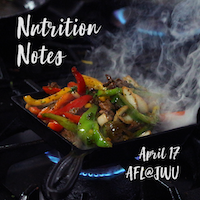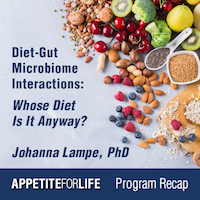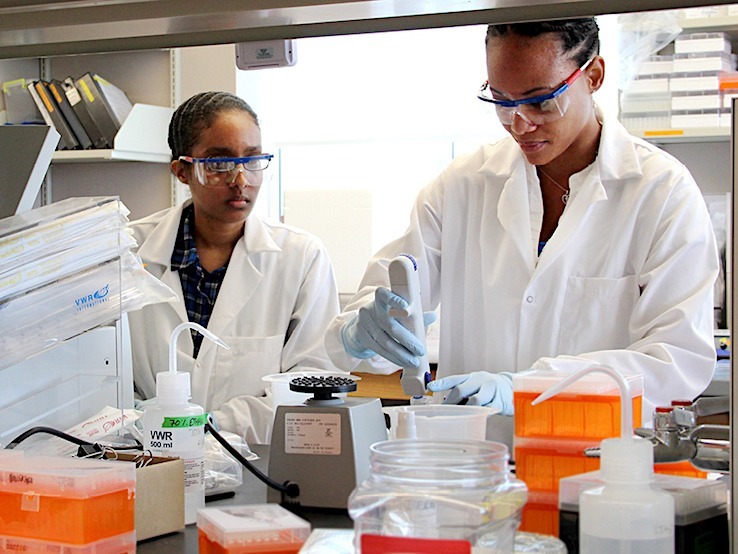News
Our research not only influences the scientific community, but the general public as well. We strive to share our discoveries with everyone. Read some of our latest articles on what is happening at the Nutrition Research Institute.
Zeisel receives AICR’s Distinguished Service Award
May 20, 2019 – Steven Zeisel, MD, PhD, professor in the Department of Nutrition at the UNC Gillings School of Global Public Health and director of the UNC Nutrition Research Institute in Kannapolis, N.C., was awarded the American Institute for Cancer Research’s (AICR) Distinguished Service Award at the institute’s annual meeting May 16, 2019.
Sign-up for an NRI Summer Tour
May 20, 2019 – See where and learn how scientific discovery takes place by touring two facilities on the NC Research Campus in Kannapolis: the UNC Nutrition Research Institute and the NCSU Plants for Human Health Institute. Register today!
Studies Explore Mechanisms Behind Obesity-Cancer Link
May 20, 2019 – Research findings presented at the American Association for Cancer Research Annual Meeting 2019 explore possible reasons for obesity-related resistance to breast cancer treatment and possible strategies to overcome obesity-related immune suppression in cancer.
Nutrition Decisions in a Conflicting World: Eggs-actly the Issue
April 18, 2019 – How are we expected to make healthy choices about food when the headlines are so confusing? We all suffer whiplash when we read butter is bad, then butter is good; when red meat is bad, then red meat is good; when red wine is good, and then it is bad….so, what is the headline du jour?
AFL@JWU Recipes – April 17, 2019
April 17, 2019 – Chef Megan Lambert, MS, RD, Senior Instructor in College of Culinary Arts at Johnson & Wales University, Charlotte, prepared healthy, delightful One-Pan Wonders recipes while Steph Saullo, MS, RD of the UNC Nutrition Research Institute, shared nutrition information on each recipe. The recipes from the April 17, 2019 Appetite For Life @ Johnson & Wales University program are available here for your cooking enjoyment!
AFL@JWU Nutrition Notes – April 17, 2019
April 17, 2019 – The science on food and nutrients and their relationship to health is complex. Individuals are unique and there are various factors that influence health outcomes. Researchers at the UNC Nutrition Research Institute (NRI) are working very hard to understand the intricacies of diet and nutrients, and their relationship to disease prevention and progression with the goal that general dietary guidance will be replaced with personalized nutrition recommendations.
AFL Program Recap: "Diet-Gut Microbiome Interactions: Whose diet is it anyway?"
March 22, 2019 – If you missed our March Appetite for Life presentation by Joanna Lampe, PhD, RD, you can catch up. Watch the entire program on video now. The live presentation took place at Forty-Six in Kannapolis on Wednesday, March 13, 2019.
NIH Grant To Study Gene Mutation Associated with Rare Disease
March 22, 2019 – Sergey A. Krupenko, PhD, professor of nutrition at the UNC Nutrition Research Institute (NRI), has been awarded a $2.4 million grant from the National Institutes of Health for his research project, “Regulation of Mitochondrial Function by Folate...
Personalized nutrition: A diet for every individual?
February 25, 2019 –Emily started gaining weight when she was in her 30’s, after having two kids and dealing with a stressful job. Her weight gain led to increased blood pressure and higher cholesterol levels. When she visited her doctor, the doctor advised that she change her diet to help her lose weight and improve her cardiovascular health. Emily knew following a diet was difficult, and it took a few false starts for her to follow one consistently.
Support the NRI
By donating to the Nutrition Research Institute, your money targets the root of most American disease. Our scientists focus on how our genes respond to food so that soon medical practitioners will be able to guide people in their health from childhood through old age. Our critical research depends on the generosity of people like you.










